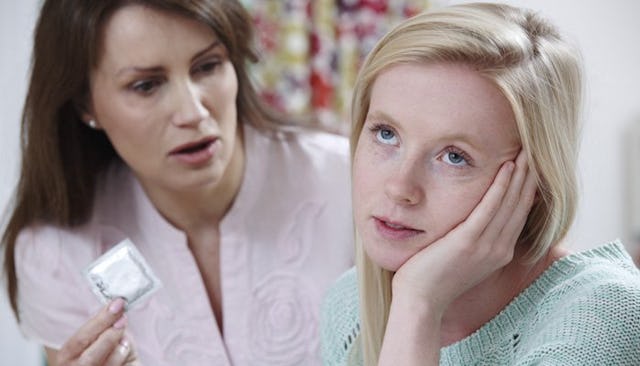Why We Started Talking To Our 7-Year-Old About Sex

I was recently at a birthday party for two brothers born close together. One was turning 8, the other turning 10. Most of the parents had dropped their kids and raced off to get two hours of child-free time on a Sunday afternoon. A handful of us stayed and got chatting.
With the kids on the cusp of their tween years, I was curious to know: What were other kids asking about sex? Were they talking about it at home as much as we were? The kids at the party ranged from age 7 (my son’s age) to about age 12. I was hoping some of the more seasoned parents would be able to tell me they’d been around this bend too.
But when I asked, I was taken aback to realize that the prevailing attitude was either, “Oh, thank God we haven’t hit those questions yet,” or “We also got him a book.” These were the parents of the kids over 10. The parents of the 7-year-olds looked horrified when I said, wow, we were—to my immense surprise—already talking about sex a lot at home.
Why? Well, here it is:
1. I think my parents’ generation got it wrong.
I was raised with the classic ’80s approach to sex ed. To wit, my parents said nothing until they realized that puberty was imminent. Then they left a carefully placed, cartoony book in my room, by which time I had pieced together bits and pieces of mismatched information from Anyday ads, advice columns and pages of Sidney Sheldon novels, as well as whispered details from friends. None of this—nor any of the sexual reproduction illustrations in our textbooks at school—bore any connection to any of the frissons of attraction I had for some of the boys in my math class.
Needless to say, I had the idea that my own parenting style would be somehow more open, honest and relaxed (not to mention hipper and cooler). I didn’t know how, or at what age exactly, I’d have to start thinking about it, but I knew something had to work differently.
2. I didn’t want to try to talk through teen embarrassment.
One of the reasons my parents couldn’t talk to me about sex was that they were too uncomfortable. The other main reason was that they had left it until too late. By the time I was 12, I was mortally embarrassed to hear words like “penis” or “vagina” from my parents’ lips (let alone anything more detailed than that), because they had never used this language casually with me before. Younger kids are curious and interested enough to grasp the information without getting curled up in a mess of mortification.
3. There are loads of fantastic books designed for kids age 4 up, 7 up and 11 up.
Primary school kids are used to poring over books with a combination of cartoons, info, and questions and answers. Teens just feel like they’re receiving an indirect lesson or lecture. But a 7-year-old will take on board the information he needs, come back and ask questions if he needs to, and then go back to computer games, all without missing a beat.
4. I wanted to empower my kid with clear information.
Playground power play is a complex thing, and I remember that kids who were in the know about sex and sexuality had a peculiar power over the rest of us. They could come and whisper, “Have you heard of this…?” and they had the power to gross you out, scare you and make you feel clueless all at the same time. I think teaching kids straight information about sex makes it more likely that they can shrug or laugh off this kind of sexualized bullying. Demystifying sex also makes them less likely to try use it as “power” information over other kids.
5. He asked.
I know different kids are ready for information at different times. But my son, at 7, was asking for information. He’d seen me go through my second pregnancy when he was about 5, and at that stage, he didn’t have questions, and he wasn’t interested in knowing much about babies. But with the third pregnancy, he’s been enormously curious, and the questions led easily into conversations about where babies come from.
6. It’s interesting and fun to field the questions.
Sometimes his questions lead to a simple answer and he goes back to reading Beast Quest or riding his bike or playing Minecraft. Other times, he comes back with curious questions.
“If you and dad have sex again, will the baby turn into twins?”
“What happens if you have sex too many times, and we end up with seven brothers and sisters?”
“How will I know who my girlfriend is supposed to be, someday?”
7. There’s way too much to talk about in one go.
My parents definitely thought there was something called the Birds and the Bees, and that you could sit down and cover it in a significant chat or two. But the Sex Talk is a misnomer. It’s not just where babies come from. It’s not just sex. It’s not even just reproduction, gestation and pregnancy. It’s feelings and changes and smells. It’s the difference between kids and teens and grown-ups. It’s all the crap on Disney channel about girlfriends and boyfriends. It’s talking about gender roles and rumors and peer pressure.
I’m really glad he started asking and that we started talking about it. I’m glad it’s just another topic of conversation, and no one has to gulp or cringe or sit down for a serious chat. I’m glad it’s a topic we’ve raised now, so that we have years to talk about it as much or as little as he needs us to.
This article was originally published on